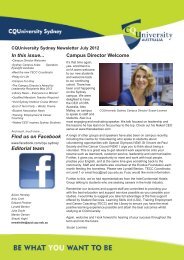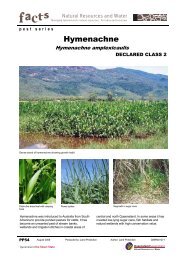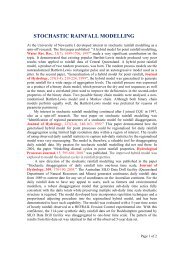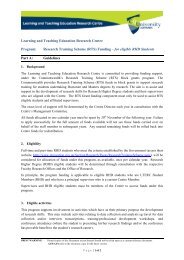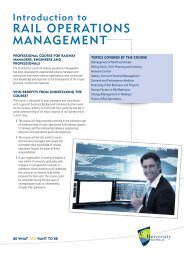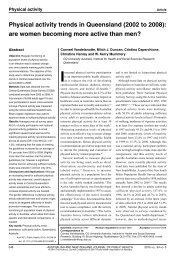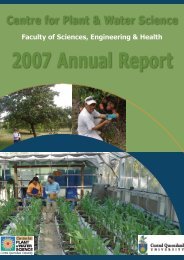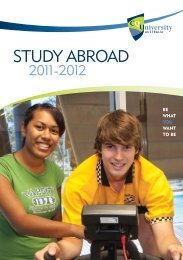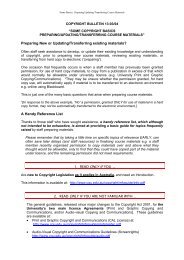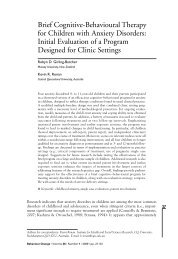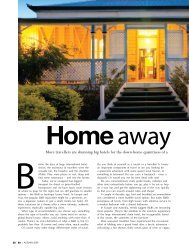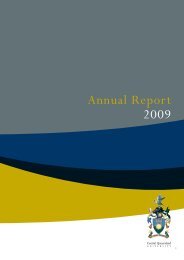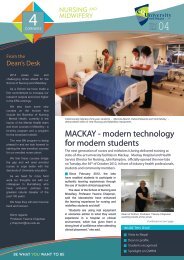CQUniversity Annual Report - Central Queensland University
CQUniversity Annual Report - Central Queensland University
CQUniversity Annual Report - Central Queensland University
- No tags were found...
You also want an ePaper? Increase the reach of your titles
YUMPU automatically turns print PDFs into web optimized ePapers that Google loves.
<strong>CQ<strong>University</strong></strong> ANNUAL REPORT 2012ENGAGED LEARNING AND TEACHINGOUR AIM: <strong>CQ<strong>University</strong></strong> will attract and retain more students, helping them to achieve their educational goals regardless of their culturaland family background or their country of origin. We will offer a range of ways for students to access higher education and reach theireducational potential. We will provide a stimulating environment that promotes and supports learner engagement utilising appropriatetechnology and infrastructure.ACHIEVING TEACHING EXCELLENCEIn 2012, the <strong>University</strong> maintained a focus on providing opportunitiesfor academic staff development. This included a restructuredorientation program for new academic staff and a revised GraduateCertificate in Tertiary Education, with courses modified to better meetthe needs of <strong>CQ<strong>University</strong></strong>’s academic staff. A number of learning andteaching seminars were held in support of the assessment, engagedlearning and teaching, and teaching for success themes with speakersfrom <strong>CQ<strong>University</strong></strong>, across Australia and further afield, includingVisiting Professor Jonathan Weyers from Dundee <strong>University</strong>, Scotland.The scholarship of learning and teaching is promoted through theactivities of the <strong>University</strong>’s two education research centres: theLearning and Teaching Education Research Centre (LTERC) and theInternational Education Research Centre (IERC) which together haveover 100 members with shared interests in a wide range of aspects ofresearch and scholarship.The <strong>University</strong> supports a number of Communities of Practice (COP) thatenable staff with shared interests to exchange ideas and formulate plansto achieve outcomes on topics that have a direct impact on learningand teaching, including aspects such as the first-year experience,work-related learning and learning through simulation and teamwork.The <strong>University</strong> hosted its Learning and Teaching Showcase in Novemberand produced a new issue of its learning and teaching magazine,Learn, which aims to share good practice among staff through raisingawareness of the <strong>University</strong>’s teaching activities and successes.<strong>CQ<strong>University</strong></strong> recognises and supports staff for their contributionsto learning and teaching excellence and innovation through grantsand awards. The <strong>University</strong>’s Learning and Teaching Grants play animportant role in enabling staff to develop and test new ideas, aimingto enhance learning and teaching practices to achieve better learningoutcomes for students. They also serve as a springboard for externalnational grant applications. Nine Learning and Teaching Grants wereawarded in 2012.The <strong>University</strong>’s Learning and Teaching Awards are designed to supportapplications through a tiered process that can result in a nationalcitation or award. In 2012, four Learning and Teaching Awards werepresented. The <strong>University</strong> also celebrated the success of ProfessorKerry Reid-Searl and Ms Sherie Elliott, who both received a Citationfor Outstanding Contributions to Student Learning from the FederalGovernment’s Office for Learning and Teaching. In additionProfessor Reid-Searl was presented with a national award forTeaching Excellence particularly related to her ground-breakingwork in nursing simulation – this award was given to only 10academic staff in 2012 and is the first time that a <strong>CQ<strong>University</strong></strong>staff member has received this award. Mr Nicholas Ralphfrom <strong>CQ<strong>University</strong></strong> Noosa won the Australian Nurse of theYear (Innovation in Nursing) Award in 2012 for his work onmobile clinical learning. In addition, <strong>CQ<strong>University</strong></strong> staff weresuccessful in securing a share of $509 000 for two Innovationand Development Grants approved and funded by the Office forLearning and Teaching (DIISRTE).In 2012, the Industry, Vocational Training and Access EducationDivision established an Academic Articulation Steering Committeejointly chaired by <strong>CQ<strong>University</strong></strong> and CQ TAFE. Working toward the<strong>University</strong>’s aim to become a dual sector university, the Committeedeveloped new pathways for trades and vocational studentsinto <strong>CQ<strong>University</strong></strong> degrees and began the development of new<strong>CQ<strong>University</strong></strong> degrees with embedded diploma outcomes.The Committee established 11 new dual awards, each with twocomponents: a vocational diploma and a university degree. Creditarticulation pathways towards the degree component are clear and thedual offers provide direct entry into <strong>CQ<strong>University</strong></strong> degrees, removingthe need for students to reapply through QTAC the dual offers alsoprovide interim exit points, with different qualification levels.<strong>CQ<strong>University</strong></strong> is the first university in Australia to appoint an Aboriginal orTorres Strait Islander person as Chair of its Academic Board. The Pro Vice-Chancellor and BMA Chair (Indigenous Engagement), Professor BronwynFredericks, has recently been appointed to the role for three years.Additionally, the Office of Indigenous Engagement has worked withDeans of Schools to increase their knowledge and capacity to deliverIndigenous-specific content within courses as well as improve theirengagement of and service delivery to Indigenous students andcommunities. An example of this is working with the Dean of Educationto increase the capacity of Education students to teach Indigenoushistory, as well as teach Indigenous students. This is a requirement ofEducation graduates in coming years. This work has also extended toworking collaboratively to participate in the national More Aboriginaland Torres Strait Islander Teachers Initiative (MATSITI).25REVIEW OF OUR ACTIVITIES



